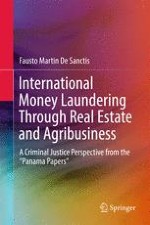2017 | OriginalPaper | Buchkapitel
3. Money Laundering Typologies Evidenced in the “Panama Papers”
verfasst von : Fausto Martin De Sanctis
Erschienen in: International Money Laundering Through Real Estate and Agribusiness
Aktivieren Sie unsere intelligente Suche, um passende Fachinhalte oder Patente zu finden.
Wählen Sie Textabschnitte aus um mit Künstlicher Intelligenz passenden Patente zu finden. powered by
Markieren Sie Textabschnitte, um KI-gestützt weitere passende Inhalte zu finden. powered by
